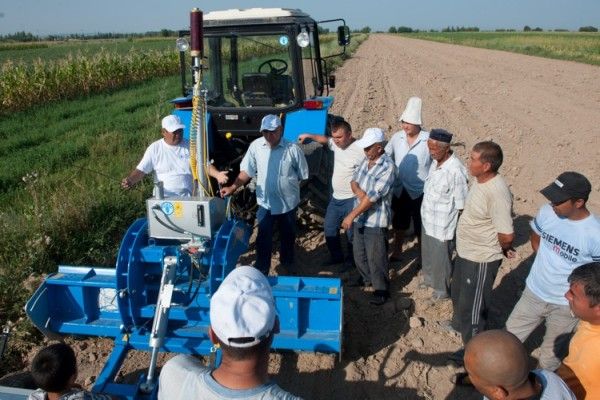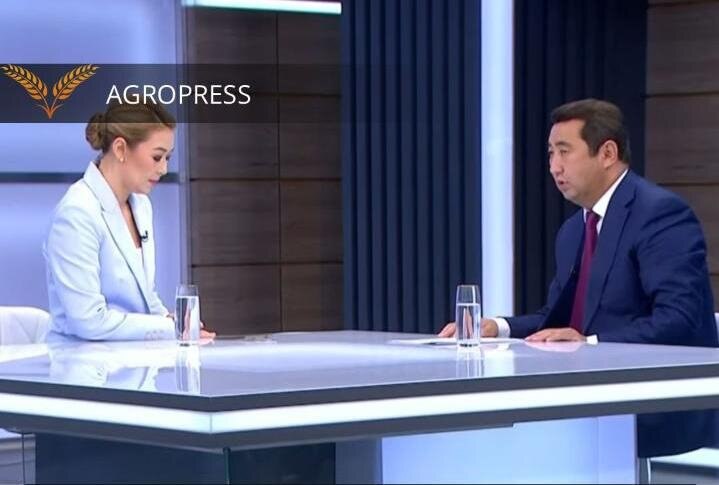BISHKEK (TCA) — Prime Minister of Kyrgyzstan Mukhammedkaly Abylgaziyev sharply criticized the Ministry of Agriculture, Food Industry and Land Reclamation at a recent Government meeting.
Agriculture Minister Nurbek Murashev optimistically reported on the achievements in the sector. However, a good harvest was not due to the Ministry’s efforts, but due to favorable weather and hard work of farmers.
Export problems
The country cannot fully meet the needs of the domestic market, not to mention the export of products, Abylgaziev said. Despite preferential loans, grants and budget funds allocated, the Ministry still cannot find effective mechanisms for the integrated development of agriculture, he added.
There were problems with the export of products, for instance when Uzbekistan imposed a ban on the import of Kyrgyz potatoes. Instead, the Ministry could arrange export to other countries, including the northern regions of Russia.
If the Ministry had concluded the necessary agreements in advance and explained the conditions for international certification of goods to farmers, the farmers’ labor would have paid off, and the State would also receive a profit. But the farmers are forced to solve all their problems themselves.
No creativity
The situation in the agrarian sector is difficult mainly due to the poor work of the Agriculture Ministry, MPs believe. There is no creativity and coordination there, and the staff does not apply new methods. The Parliament often receives complaints about the Ministry’s work.
MP Irina Karamushkina suggested eliminating the Ministry.
“We have the Agriculture Ministry but there is no state land and collective farms, everything is in private hands. Why should the State maintain the huge Ministry staff?” she asked, advising to transfer its functions to the Community Development and Investment Agency.
According to official data, the total number of the Ministry’s employees is 4,880 and its budget is 1.7 billion soms for this year.
Minister Murashev said he was ready to leave the post if the country’s leadership would be displeased with him. However, ex-Minister of Agriculture, Torogul Bekov, believes that the Minister alone is not to blame for the problems of the agricultural sector.
Poor management system
Murashev is an experienced professional, but due to the existing management system in this sector, any minister would be in the same situation, Bekov told Vesti.kg news agency. The Agriculture Ministry cannot hire good specialists due to extremely low wages, from 4 thousand soms in the field to 12 thousand soms in Bishkek.
In Russia, the Agriculture Ministry is a distributor of large financial assets. It provides loans for seeds and pedigree cattle. In Kyrgyzstan, the Agriculture Ministry has no such powers but is responsible for all this.
To improve the agro-industrial sector, it is necessary to promote Kyrgyz products abroad, and this should be done not only by the Agriculture Ministry, but also the Economy Ministry, Ministry of Foreign Affairs, embassies, veterinary and customs services, and other state bodies.
Two-thirds of the Kyrgyz live in villages. Thus, the issue of the well-being of farmers, good harvests and the ability to sell products are of strategic importance to the State.
Kyrgyzstan’s main export products are vegetables, fruit and beans. Therefore, it is necessary to finance the construction of beans packing plants in the Talas region, where beans are grown, and to build vegetable storehouses in other areas.
Beans
The Government often reports that Kyrgyzstan ranks first in the production of beans among the Central Asia countries.
Beans are the main export-oriented product of the Talas province. More than 76% of its population is engaged in the cultivation of beans. In the 1990s, productive varieties of beans were imported from Turkey to Talas.
In 2018, beans were planted on 57,138 hectares, and the harvest was about a hundred thousand tons. However, a good harvest did not bring joy to farmers. Prices for beans reached a historic low level of 25 soms per kilogram at the end of October ($1 equals 69 soms), and Talas farmers were ready to go to a protest rally, MPs said.
The last time such low prices were in 2011 when unfavorable prices for beans in the world market affected the economic situation of Talas farms.
In 2013, there was a bean boom, when the price rose to 100 soms per kg, and the entire Talas province switched to growing beans. However, after Turkey introduced the export duty, prices dropped.
In addition, due to the illiteracy of farmers, the land has been depleted and the quality of beans decreased which affected its price.
Potatoes
According to the Agriculture Ministry, 1.5 million tons of potatoes were harvested this year, with an internal demand of 800-900 thousand tons. It was planned to export about 600 thousand tons.
However, farmers could not sell the crop even at a low price, and there is no place to store it. On the advice of the authorities, farmers have grown more potatoes than before, hoping to export to neighboring countries.
In early November, Kyrgyzstan resumed potato exports to Uzbekistan. According to the Kyrgyz Agriculture Ministry, Uzbekistan provided a list of Uzbek companies that are allowed to import potatoes. Of the planned two thousand tons, Kyrgyzstan’s farmers have exported about one hundred tons of potatoes.
Almost every year there is an overproduction of a certain crop. As a result, prices fall and farmers suffer losses. Similar problems were with garlic, cabbage and other crops.
Wheat
The profitability of wheat in Kyrgyzstan is very low, agricultural expert Ulan Adamaliyev says. Farmers often cannot even return the money invested in wheat.
However, they traditionally continue to sow wheat, because other crops require appropriate technologies. Local farmers often do not know how to calculate the cost price.
The Agriculture Ministry has no seed renewal system, and the situation with the seed fund is very bad while the profitability of any crop depends largely on the quality of seeds.
Recently, at a Parliament meeting, Speaker Dastanbek Jumabekov said that farmers who sow wheat cannot make a profit. He accused the Agriculture Ministry of not being engaged in the cultivation of new wheat varieties.
Need to unite
The disunity of farmers in Kyrgyzstan affects yield, say experts of the Federation of Organic Development Bio-KG which unites about 380 thousand family farms. On small plots of land of two hectares, farmers grow various crops with different needs for water and growing season lengths. As a result, yields reduce.
Bringing together farmers around a single crop will help avoid these problems. It will be easier for farmers to sell a large volume of products. In addition, they can participate in trade fairs.
Due to small-scale production, local farmers cannot successfully export their products. Kyrgyz farmers need to unite in cooperatives. Preferential group lending could stimulate the cooperation of farmers, Bio-KG experts say. Concessional lending and tax exemption could be other instruments of economic encouragement of agrarians united in cooperatives.
Recently, seed farms and large potato producers of the northern regions — the Issyk-Kul, Naryn and Chui provinces — created the Association of Potato Growers. The association will assist potato producers in marketing their products, introducing advanced technologies, and will also create a platform to develop a common opinion on price policy regulation.








